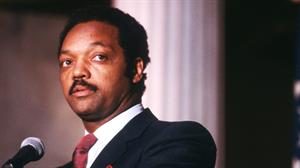Social Justice Activists | Jesse Jackson
 Jesse Jackson was born October 8, 1941, in Greenville, South Carolina. While an undergraduate, Jackson became involved in the civil rights movement. In 1964, Jackson graduated from college with a degree in sociology. The next year he went to Selma, Alabama, to march with Dr. Martin Luther King, Jr., eventually becoming a worker in King's Southern Christian Leadership Conference. In 1966, he moved his wife, children, and himself to Chicago, where he did graduate work at the Chicago Theological Seminary. Jackson never finished his studies, but was later ordained by the minister of a Chicago church. In addition, King, who was impressed with the young leader's drive and passion, appointed him director of Operation Breadbasket, the economic arm of the SCLC. He formally resigned from the organization in 1971.
Jesse Jackson was born October 8, 1941, in Greenville, South Carolina. While an undergraduate, Jackson became involved in the civil rights movement. In 1964, Jackson graduated from college with a degree in sociology. The next year he went to Selma, Alabama, to march with Dr. Martin Luther King, Jr., eventually becoming a worker in King's Southern Christian Leadership Conference. In 1966, he moved his wife, children, and himself to Chicago, where he did graduate work at the Chicago Theological Seminary. Jackson never finished his studies, but was later ordained by the minister of a Chicago church. In addition, King, who was impressed with the young leader's drive and passion, appointed him director of Operation Breadbasket, the economic arm of the SCLC. He formally resigned from the organization in 1971.
The same year Jackson left the SCLC, he founded Operation PUSH (People United to Save Humanity). Jackson created the organization, based in Chicago, in order to advocate black self-help and, in a sense, serve as Jackson's political platform. In 1984 Jackson established the National Rainbow Coalition, whose mission was to establish equal rights for African-Americans, women, and homosexuals. The two organizations merged in 1996 to form the Rainbow/PUSH Coalition.
In 1984 Jesse Jackson became the second African-American to run for the U.S. presidency. Jackson placed third in the Democratic primary voting and garnered a total of 3.5 million votes, surpassing Chisholm's ballot success.
In 1990 he won his first election, when he captured one of two special unpaid "statehood senator" posts created by the Washington City Council in order to lobby the U.S. Congress for statehood for the District of Columbia.
In 2000 President Clinton awarded Jackson the Presidential Medal of Freedom. That same year, he received a Master of Divinity degree from the Chicago Theological Seminary.
A noted author, his books include Straight from the Heart (1987) and Legal Lynching: Racism, Injustice, and the Death Penalty (1995).
Sources used/additional reading:
http://www.biography.com/people/jesse-jackson-9351181#later-years
Legal Lynching: Racism, Injustice, and the Death Penalty
By Jackson, Jesse